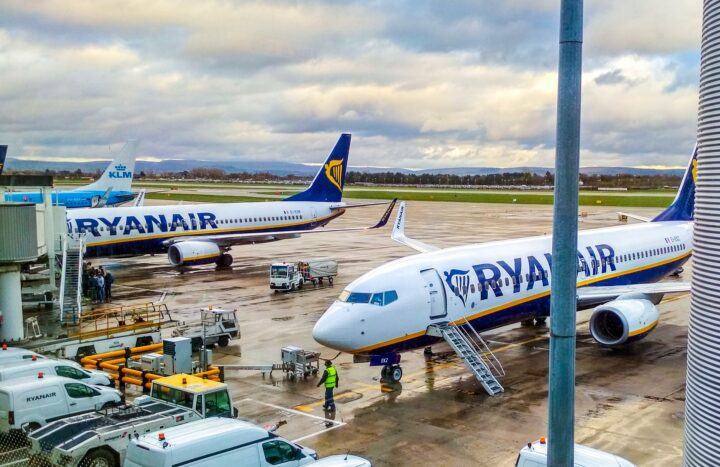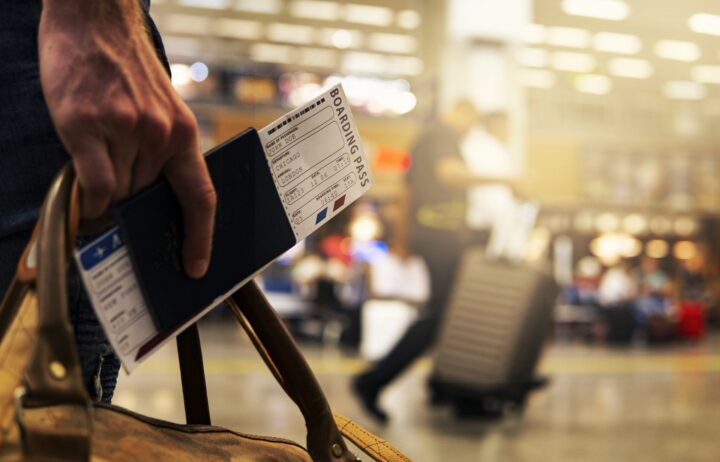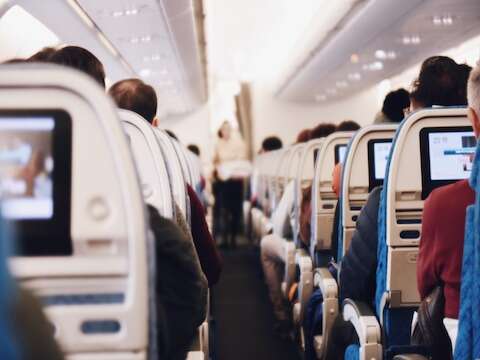Air Passenger Duty
On this page you can find everything you need to know about Air Passenger Duty, including what it is, how it has evolved, AEF’s view and alternative ways of taxing aviation.
Background
The aviation industry has always benefitted from little or no taxation on key products, despite its notable impact on climate change and public health. Exemption from fuel duty and VAT has kept airfares artificially low. The resultant growth responsible, in part, for the sector’s 125% increase in CO2 emissions since 1990. In direct contrast, the UK’s overall emissions decreased by 43% in the same period.
Jet fuel has always been exempt from tax in the UK and on the majority of international routes around the world. This is often mistakenly attributed to the provisions of the Chicago Convention of 1947. However, the real culprit is the multitude of Air Service Agreements (bilateral agreements between states that govern how aviation operates between those countries/regions). Most ASA’s prohibit their signatories from levying a fuel tax on international flights, although fuel duty can be applied to kerosene for domestic use and Europe is considering a tax on intra-EU flights.
As well as this, VAT is not currently applied to airline tickets. In the UK, VAT has a long-established principle: a few essential goods and services, including bus and rail, are taxed at lower or zero rates, whilst most goods, including petrol, are taxed at the full 20% rate. The current approach to aviation clearly violates these norms. A first class airline ticket is in the same category as food and medicine. There is no rationale for treating air travel differently from most goods and services.
If aviation fuel was taxed at the same rate as petrol for motorists, it would raise well in excess of £12 billion for the Chancellor. To partly offset this, and ensure that the industry makes a fairer contribution to Government revenue, the UK levies an Air Passenger Duty.

What is Air Passenger Duty?
Air Passenger Duty is charged on passengers departing from a UK airport and ranges depending on the distance of flight and class of travel. It contributes significantly to public finance, having raised an estimated £3.8 billion in 2023-4.
Charges on passengers are currently split into four flight bands, above and below 5,500 miles, that are further split into three tax brackets according to the class of the ticket. The lowest rate of APD is currently charged on domestic flights for passengers in economy class and is £7. This rises to £607 for a long-haul flight over 5,500 miles in planes over 20 tonnes that can carry fewer than 19 seats (targeting private jets). You can get a full breakdown of rates of APD on the Government website.
There have been a few changes since it was first introduced in the 90s, but the most significant change in recent years came in 2023 when the Government halved the duty for domestic flights while creating a new distance band for ultra-long-haul (over 5,500 miles). A useful research briefing on the introduction of APD and its history can be found here. HMRC also produces a bulletin providing statistics on the number of passengers travelling in each band at the reduced and standard rates.
Are there any exemptions?
Children under 16 travelling in economy are exempt. The devolved administration in Northern Ireland also exempts long-haul flights from the region after it was persuaded that the daily service between Belfast and New York was under threat due to competition with Ireland. Departures from remote parts of the Scottish highland and islands are also exempt.
Reaction to APD
Airlines have long lobbied against APD, and many welcomed the proposed cuts to APD on domestic flights. Talking to The Guardian, Airport Operators Association chief executive Karen Dee said, “Domestic aviation suffered a double-hit in the last year, with the collapse of Flybe and the Covid-19 pandemic, and this offers a glimmer of hope for the future.”
But the International Air Transport Association (IATA) criticised the proposed changes to long-haul APD rates, saying that this ‘cash grab’, masquerading as a ‘green tax’ is ‘the height of political hypocrisy’.
Environmental campaigners have also criticised the proposed decrease in APD on domestic flights, which will reduce the price to consumers. Friends of the Earth’s head of policy, Mike Childs said “Cutting Air Passenger Duty on domestic flights is an astonishing move that completely flies in the face of the climate emergency. The Chancellor should be making it cheaper for people to travel around the country by train, not carbon-guzzling planes.
“Air Passenger Duty for all flights should have been increased, or even better replaced with a frequent flyers levy, aimed at curbing multiple flights taken by a minority of people each year.”

AEF’s View
AEF believes that APD is a very modest tax for an industry that doesn’t pay VAT or fuel duty, especially given the fact that flying is a highly polluting activity undertaken largely by those on higher incomes. The Air Passenger Duty rate paid by 78% of air travellers (£13) has increased only £3 since 1997, and, adjusting for inflation, has fallen in real terms. If aviation paid the same level of duty and VAT on its fuel, as motorists currently do on theirs, revenue for the Chancellor would increase to over £11billion a year compared to the £3.8billion that APD raises today.
There are sound business, social and environmental reasons for taxing aviation more in future. Any cuts to APD – as periodically called for by the aviation industry – would increase the scale of existing environmental challenges. The evidence that cutting APD will boost trade links, as sometimes claimed, is not strong, and any cut would create a hole in public finances that would have to be made up through other means. You can read more about our reasons for being in favour of APD here.
The Government’s decision in 2021 to reduce APD on domestic flights from April 2023 was widely perceived as signalling that the Government is not taking the climate crisis seriously. An increase in domestic flights is also likely to have negative effects on noise and air pollution, AEF has argued. You can read our full response to the changes and our counter proposals here.
APD is not an environmental tax, but there is a strong climate rationale for increasing the duty. A business class seat accounts for three times more emissions than an economy seat, yet standard rate APD is only about 2-2.2 times the reduced rate paid by economy passengers. There is also a strong fairness case as these kinds of flights are very much an elite activity (with more than 70% of passengers flying domestic/short-haul economy).
Despite this modest increase, aviation remains an undertaxed sector. While the Chancellor also announced further support for the development of zero-emission flight, we need to disincentivise the use of fossil-fuels in aviation, starting with a kerosene tax.
Other approaches to taxing aviation
Alongside APD, which plays a useful role in ensuring that airlines make a contribution towards public finances, there is a strong case for introducing specific environmental taxes or charges. AEF was disappointed that HM Treasury’s recent consultation on aviation tax reform did not explore additional tax options such as a kerosene tax, VAT or an air miles levy.
One measure would be to apply a kerosene tax to all fuel uplifted in the UK. Current policy is in contrast to ordinary road users, meaning that any driver that has ever filled up their vehicle with petrol has paid more in fuel duty than British Airways, Ryanair and Easyjet combined have ever paid on their flights.
This tax exemption could also be contrary to EU practices in the future. In 2021, the EU ended fuel tax exemption for private and commercial airlines operating on routes within Europe (although this exempts long-haul international flights, which make up 60% of fuel sales). The proposed tax, which aims to incentivise the industry to move away from polluting fuels, will be introduced in 2023, escalating annually until it reaches the proposed full rate in 2033. E-kerosene or other sustainable fuel alternatives will be exempt.
One reason for the UK to align with EU proposals is to avoid the threat of ‘tankering’, which is when carriers fill their aircraft as full as possible whenever they land at an airport not subject to the same tax rules. This makes aircraft heavier and therefore increases the level of aviation emissions.
Charging VAT on airline tickets is another way to bring the UK into line with many other developed economies. No VAT is applied to airline tickets in the UK, whereas VAT or other sales taxes are applied to domestic tickets in 23 EU countries, Australia, Canada, the USA and others. VAT could be immediately applied at the full 20% rate on all first, business and private jet tickets. This means that those with the greatest ability to pay, that are causing the most climate damage, are charged more accordingly.
Another alternative to APD is the introduction of a Frequent Flyer Levy – a progressive tax on frequent flyers that aims to tackle the environmental impacts of flying in a more equitable way – or an Air Miles Levy which takes the distance flown, rather than the number of trips, into account.
AEF further outlined the options for aligning aviation taxes with environmental goals in a joint letter to the treasury in October 2021.
The interaction between these potential taxation measures need to be considered with carbon pricing schemes like UK ETS and CORSIA.
